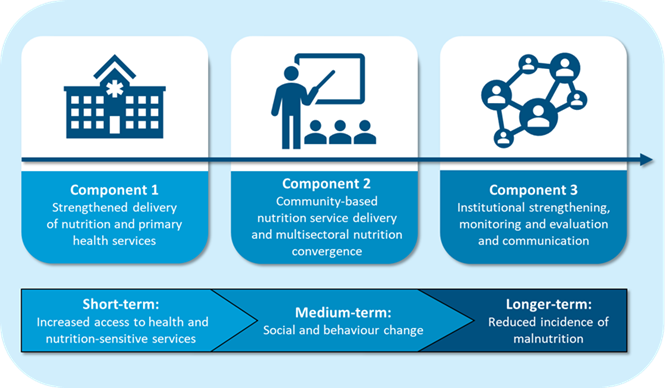Mixed-Method Impact Evaluation of the Philippine Multi-Sectoral Nutrition Project (PMNP)
Despite considerable economic growth and social progress over the past decade, recent national nutrition surveys show that malnutrition, stunting, wasting, micronutrient deficiencies–and, simultaneously, obesity–are key issues affecting Filipino children’s health. Stunting, specifically, is a high-priority public health problem in the country, with the stunting rate amongst children under five years old surpassing the Southeast Asia regional average (30% versus 27%). In fact, the Philippines have some of the highest stunting rates in the world.
The Government of the Philippines has taken legislative action to address these issues, launching the Philippine Multisectoral Nutrition Project (PMNP), a multisectoral program implemented by the Department of Health and the Department of Social Welfare and Development.
The PMNP will deliver a coordinated package of nutrition-specific and nutrition-sensitive interventions and run a behavioral change information campaign to increase the use of nutrition-specific and nutrition-sensitive interventions and social and behavioral change in 235 municipalities across the Philippines, aiming to improve key health behaviors and practices known to reduce stunting and wasting rates.

The nutrition-specific services cover essential maternal and newborn health care, including antenatal and postnatal check-ups, nutrition counseling, and dietary supplementation, among others. Key nutrition-sensitive activities promoted by the PMNP include improved water and sanitation facilities, and access to early childhood care and development services.
AIR's Impact and Process Evaluation
AIR is conducting a mixed-methods impact and process evaluation to assess the relevance, coherence, effectiveness, efficiency, impact, and sustainability of the PMNP intervention package. We will sample 3,000 households in PMNP intervention areas on topics such as access to services, food security and diet diversity, caregiving practices, children’s height and weight, and exposure to shocks to conduct a difference-in-difference impact evaluation. Simultaneously, we are conducting a three-round process evaluation to understand the effectiveness of PMNP implementation and help explain why and how the project achieved or did not achieve outcomes. The research also includes a cost evaluation to generate learnings on the use of resources during PMNP implementation.
The research will support the accountability of the program results, while also informing the scale up of the intervention package and shaping multisectoral nutrition initiatives aimed at improving nutrition and health outcomes in the Philippines.

